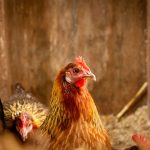Chickens are highly susceptible to heat stress due to their limited thermoregulatory capabilities. As ambient temperatures rise, chickens struggle to dissipate heat effectively, which can lead to various health issues. Signs of heat stress in chickens include panting, lethargy, reduced egg production, and in severe cases, death.
Younger and older chickens are more vulnerable to heat stress due to less efficient thermoregulatory systems. Certain breeds, particularly those with heavy feathering or dark plumage, are also more prone to heat-related problems. Heat stress in chickens can cause numerous health issues, including dehydration, reduced feed intake, and decreased egg production.
When unable to dissipate heat effectively, chickens may resort to panting, which can lead to dehydration through increased water loss via respiration. This dehydration can significantly impact their overall health and well-being. Heat stress can also cause chickens to reduce their feed intake, potentially resulting in nutritional deficiencies and weight loss.
Additionally, it can disrupt hormonal balance in hens, leading to decreased egg production and poor egg quality. Understanding these physiological impacts is crucial for implementing effective strategies to mitigate heat stress and ensure the welfare of chickens during hot weather.
Table of Contents
- 1 Providing shade and ventilation for your coop
- 2 Hydration and water management for chickens
- 3 Choosing the right bedding material for hot weather
- 4 Adjusting feeding schedules and types of feed for summer
- 5 Creating cooling stations and dust baths for chickens
- 6 Monitoring and recognizing signs of heat stress in chickens
- 7 FAQs
- 7.1 What are some signs that chickens are overheated?
- 7.2 How can I keep my chickens cool in the summertime?
- 7.3 What are some ways to provide shade for chickens?
- 7.4 How can I improve ventilation in the chicken coop?
- 7.5 Why is it important to provide cool water for chickens in the summer?
- 7.6 What are some frozen treats I can give to my chickens in the summer?
Key Takeaways
- Heat stress in chickens can lead to decreased egg production, poor growth, and even death
- Providing shade and proper ventilation in the coop is essential to help chickens regulate their body temperature
- Hydration is crucial in hot weather, ensure chickens have access to clean and cool water at all times
- Choose bedding materials that are breathable and absorbent to help chickens stay cool and dry
- Adjust feeding schedules to cooler parts of the day and consider switching to lighter, more easily digestible feeds in the summer
- Create cooling stations and dust baths for chickens to help them cool off and reduce stress
- Monitor chickens for signs of heat stress such as panting, lethargy, and decreased egg production, and take immediate action if necessary
Providing shade and ventilation for your coop
Shade and Ventilation: The Key to a Comfortable Coop
One of the most effective ways to prevent heat stress in chickens is by providing adequate shade and ventilation in their coop. Shade is essential for protecting chickens from direct sunlight and reducing the ambient temperature in their living environment. This can be achieved by positioning the coop in a shaded area or by installing shade cloth or tarps to create a shaded area within the coop. Additionally, planting trees or constructing a roof over the coop can provide natural shade for the chickens.
Ventilation is equally important for maintaining a comfortable environment for chickens during hot weather. Good airflow helps to dissipate heat and reduce humidity levels, preventing the buildup of heat inside the coop. This can be achieved by installing windows, vents, or fans to promote air circulation within the coop.
Optimizing Coop Design and Construction
By providing shade and ventilation, chicken keepers can create a cooler and more comfortable living environment for their flock, reducing the risk of heat stress. In addition to shade and ventilation, it’s important to consider the materials used in the construction of the coop. Light-colored roofing materials can reflect sunlight and reduce heat absorption, helping to maintain a cooler interior temperature. Similarly, using insulating materials in the coop can help regulate temperature and reduce heat transfer from the outside environment.
Insulation and Draft Prevention
Proper insulation can also prevent drafts during cooler evenings, ensuring that the coop remains comfortable for the chickens throughout the day and night. By optimizing the design and construction of the coop, chicken keepers can create a comfortable and well-ventilated living space for their flock, minimizing the risk of heat stress during hot weather.
Hydration and water management for chickens

Hydration is crucial for preventing heat stress in chickens, as water plays a vital role in regulating body temperature and maintaining overall health. During hot weather, chickens may require more water than usual to stay hydrated and cool down. It’s important to provide access to clean and fresh water at all times, ensuring that chickens have an adequate supply to meet their hydration needs.
This can be achieved by using large water containers or automatic waterers that can accommodate the increased water consumption during hot weather. Additionally, placing water containers in shaded areas can help prevent water from heating up in the sun, ensuring that chickens have access to cool drinking water throughout the day. Water management is also important for preventing heat stress in chickens.
Regularly cleaning and refilling water containers is essential for maintaining water quality and preventing bacterial growth. Dirty or contaminated water can lead to health issues and reduce water consumption in chickens, increasing the risk of dehydration during hot weather. Additionally, adding electrolytes or vitamin supplements to the drinking water can help replenish essential nutrients lost through panting and sweating, supporting overall hydration and wellbeing in chickens.
By prioritizing hydration and implementing effective water management practices, chicken keepers can help their flock stay cool and healthy during hot weather.
Choosing the right bedding material for hot weather
Selecting the appropriate bedding material is essential for creating a comfortable and hygienic living environment for chickens during hot weather. Bedding serves several important functions, including providing insulation, absorbing moisture, and cushioning the coop floor. When choosing bedding for hot weather, it’s important to select materials that offer good ventilation and moisture-wicking properties.
For example, pine shavings or straw are popular choices for bedding material, as they provide good airflow and absorb moisture effectively. These materials help maintain a dry and comfortable living environment for chickens, reducing the risk of heat stress and bacterial growth. In addition to ventilation and moisture absorption, it’s important to consider the insulating properties of bedding materials.
While good ventilation is crucial for preventing heat buildup in the coop, insulation helps regulate temperature and provide a comfortable resting surface for the chickens. Materials such as straw or shredded paper offer good insulation while still allowing for adequate airflow, making them suitable choices for bedding in hot weather. Furthermore, regularly cleaning and replacing soiled bedding is essential for maintaining hygiene and preventing bacterial growth during hot weather.
By choosing the right bedding material and implementing proper maintenance practices, chicken keepers can create a comfortable and healthy living environment for their flock, reducing the risk of heat stress.
Adjusting feeding schedules and types of feed for summer
Feeding schedules and types of feed play a significant role in managing heat stress in chickens during summer months. Adjusting feeding schedules can help minimize heat production from digestion and reduce metabolic heat in chickens. Feeding during cooler times of the day, such as early morning or late evening, can help prevent excessive heat generation from digestion during peak temperatures.
Additionally, providing smaller but more frequent meals throughout the day can help maintain energy levels while minimizing metabolic heat production. By adjusting feeding schedules to coincide with cooler periods and reducing meal sizes, chicken keepers can help their flock cope with hot weather more effectively. In addition to adjusting feeding schedules, choosing the right types of feed is important for managing heat stress in chickens.
Feeds with high protein content can increase metabolic heat production during digestion, potentially exacerbating heat stress in chickens. Instead, opting for feeds with lower protein content or supplementing with cooling foods such as fruits and vegetables can help reduce metabolic heat production while providing essential nutrients. Additionally, providing access to fresh greens or grass can help keep chickens hydrated while offering a source of natural cooling during hot weather.
By adjusting feeding schedules and selecting appropriate types of feed, chicken keepers can support their flock’s nutritional needs while minimizing the risk of heat stress during summer months.
Creating cooling stations and dust baths for chickens

Cooling Stations for Heat Relief
Cooling stations can include shallow containers filled with cool water or misting systems that allow chickens to wet their feathers and cool down. Placing these stations in shaded areas of the coop or run provides chickens with relief from high temperatures while encouraging natural behaviors such as bathing and preening.
Shaded Areas for Rest and Relaxation
Additionally, providing access to shaded areas with cool flooring materials such as concrete or ceramic tiles can offer chickens a place to rest and cool off during hot weather.
Dust Baths for Hygiene and Comfort
Dust baths are another important aspect of maintaining comfort and hygiene for chickens during hot weather. Dust bathing is a natural behavior that helps chickens remove excess oil from their feathers and control parasites such as mites and lice. Providing a designated area filled with fine dust or sand allows chickens to engage in this behavior, which can help them stay clean and comfortable during hot weather.
Monitoring and recognizing signs of heat stress in chickens
Monitoring and recognizing signs of heat stress is crucial for identifying potential issues early on and taking proactive measures to protect the flock. Observing chicken behavior and physical condition can provide valuable insights into their wellbeing during hot weather. Signs of heat stress may include panting, lethargy, reduced activity levels, pale combs and wattles, decreased feed intake, and reduced egg production.
Additionally, observing changes in flock dynamics or social interactions can indicate discomfort or distress related to heat stress. In addition to behavioral cues, monitoring environmental conditions such as temperature and humidity levels can help assess the risk of heat stress in chickens. Using thermometers or hygrometers inside the coop or run provides valuable data on ambient conditions that may impact the flock’s comfort and wellbeing.
Regularly checking water consumption levels can also indicate whether chickens are staying adequately hydrated during hot weather. By monitoring both chicken behavior and environmental conditions, chicken keepers can identify signs of heat stress early on and implement appropriate measures to mitigate its effects. In conclusion, understanding the physiological impact of heat stress on chickens is essential for implementing effective strategies to protect them during hot weather.
Providing shade and ventilation in the coop, prioritizing hydration and water management, choosing suitable bedding materials, adjusting feeding schedules and types of feed, creating cooling stations and dust baths, as well as monitoring signs of heat stress are all important aspects of managing heat stress in chickens during summer months. By taking proactive measures to create a comfortable living environment for their flock and recognizing early signs of heat stress, chicken keepers can ensure the welfare and wellbeing of their chickens even in hot weather conditions.
If you’re looking for ways to keep your chickens cool in the summertime, you may also be interested in learning about the importance of the size of your chicken coop door. A properly sized door can help with ventilation and airflow, which is crucial for keeping your chickens comfortable in hot weather. Check out this article on chicken coop door size for more information on this topic.
FAQs
What are some signs that chickens are overheated?
Some signs that chickens are overheated include panting, holding their wings away from their bodies, reduced egg production, and lethargy.
How can I keep my chickens cool in the summertime?
You can keep your chickens cool in the summertime by providing plenty of shade, ensuring good ventilation in the coop, offering cool water to drink, and providing frozen treats such as fruits and vegetables.
What are some ways to provide shade for chickens?
You can provide shade for chickens by using tarps or shade cloths to cover their coop and run, planting trees or shrubs to create natural shade, and using umbrellas or awnings in their outdoor areas.
How can I improve ventilation in the chicken coop?
You can improve ventilation in the chicken coop by installing windows or vents to allow for air flow, using fans to circulate air, and keeping the coop clean to prevent ammonia buildup, which can affect air quality.
Why is it important to provide cool water for chickens in the summer?
It is important to provide cool water for chickens in the summer to help them regulate their body temperature and stay hydrated. Chickens can quickly become overheated if they do not have access to cool water.
What are some frozen treats I can give to my chickens in the summer?
You can give your chickens frozen treats such as watermelon, berries, cucumbers, and corn on the cob. These treats not only help keep chickens cool, but also provide them with essential nutrients.
Meet Walter, the feathered-friend fanatic of Florida! Nestled in the sunshine state, Walter struts through life with his feathered companions, clucking his way to happiness. With a coop that’s fancier than a five-star hotel, he’s the Don Juan of the chicken world. When he’s not teaching his hens to do the cha-cha, you’ll find him in a heated debate with his prized rooster, Sir Clucks-a-Lot. Walter’s poultry passion is no yolk; he’s the sunny-side-up guy you never knew you needed in your flock of friends!







